Should I tell you that I’m going to die? Perhaps I had better not. I wouldn’t want to spoil the surprise.
Of course, death used to be something one could expect out of life, not such a shocking thing to predict at all. Now, I might as well tell you I’m going to grow a second head.
Well, I have died before, and I will die again. And if I have anything to say about it, so will you.
But I’m getting ahead of myself.
Let me start over. Forget about death. Forget about everything.
Let me start from the beginning.
My mother told me never to trust a rich man.
She said that when she flew about the house, snatching dried herbs from the rafters and slicing roots on the table with her wicked knife. She said it, her ropy muscles bulging as she threw her shoulder into her pestle, as she pulled her sleeve across her mouth to wipe away the blackberry wine dribbling down her chin.
But when we went to town to trade her powders for the many things I needed that she could not make herself, she held her chin in the air, and when the village folk called her a filthy whore and me a dirty little bastard, she clutched her silk shawl with the swordfish embroidery high up on her shoulders. When we got home, she’d fly around the house again, now crying that my father would never allow anyone to treat her this way, that if he were still alive, he would have slain them all where they stood, how could I let them speak to her that way, how dare they speak to the mother of Vyacheslav Semyonovich’s son like that.
“Yuyu,” she’d say, rubbing the pad of her wine-slick thumb on my sticky forehead. “Iyu Vyacheslavovich Ony. Your father was a great man and a terrible man. A powerful volshebnik, a generous spirit, a drunk, and a lecher. What are you going to be? Yuyu. Tell me.” And she’d shake my shoulders, and I’d cry and say I would be good, or I’d laugh and say I’d be a drunk and a lecher.
And she’d fly around the house no matter what I said and throw her mortar across the room and break my toys in her hands and tear at her hair, and I’d tear around after her, screaming to the point of giddiness, stomping on her silk shawl. We’d scream and tear until we tired ourselves out, and in the evening she’d slap warding talismans over the door and windows and grind chalk and dried masharoot into a fine powder. While I crouched in the doorway, she went into our clearing and scattered the powder at the treeline, encircling our little one-room hovel and our empty chicken coop and sparrow cage in a thin white line, her fingers like a phantom’s.
She couldn’t sleep until the house was enclosed, until she’d prowled the perimeter looking for gaps while the sun became a distant memory in the sky.
“Yuyu,” she’d say, drawing the blanket up to my chin and kissing my forehead, “you’re going to be just like your father.”
***
I was eight when Knyaz Aksana’s men came and took me from my mother. Knyaz Aksana, my father’s sister, brought me to Whitecap Palace, and I became Iyu Aksanevich. I lived there until I was sixteen, and it was time for my mandatory military service. That's where this story really begins.
I should have gone the year before, but Aksana didn’t want me going without my cousin Semchik, who was a year younger than I. Precipitously though he may have grown in the past year, he had been a small and weak child, so she certainly wasn’t going to send him a year early.
Really, me being a bastard and not anywhere in the proper line of succession, I needn’t have gone at all, but Aksana said if she was spending all this time and money educating me, then I wasn’t getting off without doing the hard work. I thought I was doing plenty of hard work at Whitecap, suffering through remedial lessons and learning with which utensils I was not allowed to clean my ears, but I knew that military service in Gorakino meant prowling the mountain border and hunting ghosts, so I was more than willing to go.
Semchik and I departed with a cadre of minor cousins pledged to Aksana, most of whom thought they were better than the bastard of a disgraced and dead knyazhich, and some of whom were right.
I thought I was prepared for the mountains. Where I grew up with my mother was the kind of hilly where you could see out to the sea from the high points. Compared to Whitecap City, which sat on Khorizova’s gentle coast, it was downright rugged. When I first saw Gorakino’s famous mountains on the horizon, I thought we would be there within a day.
A week later, we arrived at the Watchman’s Palace. The palace, rising up solid and stern over high walls, was more like a fortress, but then, as Gorakino was always so quick to point out, it was the only thing standing between us and being overrun by ghosts from the Sundered Lands.
I felt ready to die already. The altitude made me sick, and I wanted to lie down and be somewhere it wasn’t snowing in the middle of spring. So, when a couple of boys stopped us in front of the towering wooden gates, I was out of patience.
“Announce yourselves and your purpose,” the shorter one said in a trilling voice that gave the lie to his authoritative posturing, and I rolled my eyes.
Semchick stuttered out something too quiet for even me to hear. I leaned over and whispered, “Speak up,” in his ear, then gave him a little shove between the shoulder blades.
He stumbled to the fore, and the short boy snorted, but then Semchik cleared his throat and said in his still-cracking voice, “I am Semyon Aksanevich Moryakov, heir of Knyaz Aksana. I am here from Khorizova with…” and then he listed out a long series of names of our compatriots, during which I studied the boys at the gates, looking for any hints of mockery or impatience (even as I myself jiggled my leg and shivered absently).
The short one with the ratty face was chockablock with both, but the taller one wore no expression at all, which I found even more discomfiting. He stood still as a statue, hands held behind his back. When the wind disturbed his braided hair, it flowed behind him like waves in a dark river. His face was like a rock carving worn smooth by years under the current of that river.
He looked like he took things very seriously. He looked like he could recite every rule currently enforceable in Gorakino and a great deal of the archaic ones, too. We, I had no doubt, would not get along. I made that judgment, and then Semchik said something that drew my attention back: “...and Iyu Aksanevich Ony, my first cousin. We are here to serve.” He bowed, the rest of us bowed, and the boys at the gate bowed back, and then, finally, they let us in.
***
That day, I didn’t do much more than gorge myself on an alarming amount of goat meat and down mug after mug of the dark beer they brewed up in the mountains.
Semchik couldn’t stop shaking next to me, and I couldn’t tell how much was the cold and how much was the nerves. Either way, I recommended he drink more, but Semchik was worried about making a bad impression, and tipping his mug up over his mouth did not produce the soothing effect I’d hoped it would. It mostly just splashed beer all down his front, which made him both colder and even more concerned about making a bad impression, and which made me feel bad. So I set about finding other ways to solve his shivering problem.
Behind the high table stood a tall, wide stone hearth burning with a fire I could barely see for the long row of fur-draped, braided Okhotnikovs, each grimmer than the next, obscuring it.
“Look.” I nudged Semchik. “Let’s go up there.”
“Up there?” The color drained from his face. “Why?”
“First of all, it’ll be warmer by the fire, and second of all, maybe once you talk to them, you won’t be so nervous.”
“I don’t think we’re supposed to go up there.”
“Why not? All the big, official speeches are done, most of the eating is done, it’s just drinking and milling around now. They’re drunk by now, so it’s really the best time to do it.”
“You’re drunk.”
“Unless they’re angry drunks, but probably not. I mean. Probably not.”
“I don’t know…”
“C’mon, I’m cold, too.” I grabbed his arm and dragged him after me.
The two boys from the gate were off-center from the fire, but they were the only two faces I recognized, and the two nearest to us in age, so I made a beeline for them. If I noticed sour looks on their faces, it wasn’t until words were already coming out of my mouth. “Hello! I’m Iyu, and this is my cousin Semchik—sorry, Semyon Aksanevich.”
“We know your names,” the little rat-faced one said.
“That’s an impressive memory you have. I think we know yours, too, but you never formally introduced yourselves, and since we’ll be hunting together, I thought it would be good to—”
The rat-faced one looked at Semchik. “Why is he talking to us?”
“Uh…” I could feel the heat from Semchik’s face over my shoulder.
“I just explained why I’m talking to you,” I said, making sure my smile didn’t falter.
“Why is he talking for you?”
“He—he has a big personality,” Semchik mumbled.
I was glad he didn’t say that louder.
“And you let him call you Semchik?” Ratty scoffed.
I glanced at the one with a face like a river rock, but he was staring past us, completely without expression.
“Well, he’s my first cousin, so…”
“He’s a bastard.”
I laughed. Loudly and unintentionally. The men and women around us turned to see what the commotion was about. “That might be the quickest someone’s brought it up upon meeting me. Well spotted!”
“Filipp Artyomovich! What’s going on down there?” A large man I knew to be Knyaz Artyom said, leaning forward to peer at us, his critical eye lingering on me.
“Nothing,” Ratty said. “I’m just not sure why this bastard thinks he can talk to us.”
The knyaz’s gaze settled back on Semchik. “Semyon Aksanevich. I trust your mother is well.”
“Yes, Knyaz Artyom,” Semchik said, voice quavering.
“Iyu Aksanevich. You’re Vyacheslav Semyonovich’s son?”
“Yes. Knyaz Artyom,” I said, belatedly remembering my manners when Semchik pinched me.
“I knew your father. He was a strong-willed man.”
“Thank you, Knyaz Artyom,” I said, though I wasn’t sure it was a compliment.
He nodded. “Since you are ours for the next two years, you should know my youngest son, Filipp Artyomovich. Next to him is my nephew, Aleksandr Artyomovich. You should also know the order of things. Semyon Aksanevich, step forward.” He did, promptly. “Now, Iyu Aksanevich, you step back.” And I did, with less certainty. “That is how you should stand,” the knyaz said. “Behind him, on his right-hand side. You’re dismissed.”
***
Semchik would not talk to me.
I suppose I had embarrassed him a little bit, but I was the one who had been truly embarrassed, and you didn’t see me sulking about it. He told me (sulkily, when I managed to pry words out of him at all) that was because I was completely shameless, and I couldn’t argue with him about that.
“Perhaps I’m not allowed to argue with you at all, anymore,” I said, casting a glance back up at the high table.
If Semchik said anything, I didn’t hear it, because the boy with the face like a river rock—Aleksandr Artyomovich, Knyaz Artyom said—caught my eye and held it. I almost thought he smiled, but no, his expression (or lack thereof) never changed.
Maybe there was something wrong with him, personality-wise.

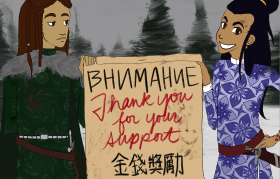
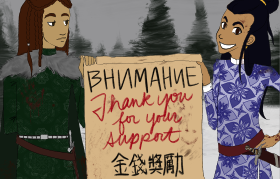
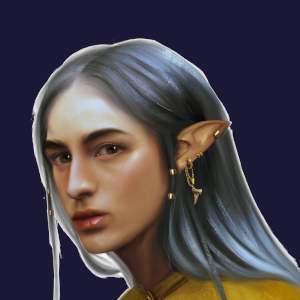








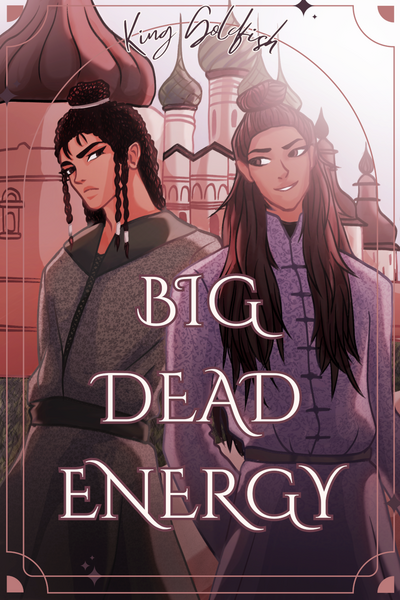
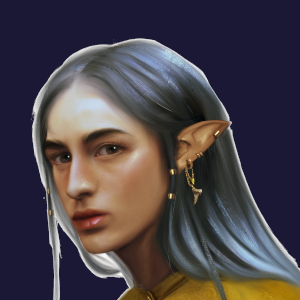
Comments (22)
See all